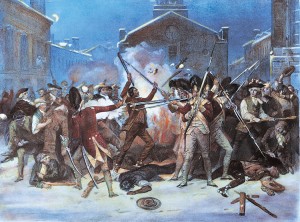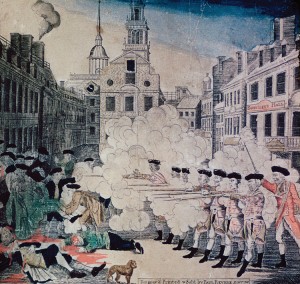Boston Massacre 250
March 4, 2020
Tomorrow, March 5, marks 250 years since the Boston Massacre took place in Massachusetts in 1770. One of the most famous events of colonial American history, the Boston Massacre was not actually a massacre but rather a street clash that ended in the killing of five colonists by a squad of British soldiers. The name Boston Massacre was invented to rally American colonists against British policies. The massacre was one of the many events that led to the American Revolution.

Crispus Attucks, center, was a leader of the patriot mob that was fired upon by British troops in the Boston Massacre of 1770. Attucks and four other people were killed in the clash. Credit: Granger Collection
To mark the 250th anniversary of the Boston Massacre, the Massachusetts Historical Society is hosting an exhibition called “Fire! Voices From the Boston Massacre.” The exhibition features engravings and personal and published accounts of the confrontation, the aftermath, and the resulting trial of the British soldiers. Tomorrow, on March 5, the National Society of the Daughters of the American Revolution will lay a wreath at the grave of the victims of the massacre in Boston’s Old Granary Burial Ground. There, the five victims—Crispus Attucks, James Caldwell, Patrick Carr, Samuel Gray, and Samuel Maverick—are buried together.
In 1768, the assignment of British troops to Boston had upset local citizens. A riot began when 50 to 60 people threatened a British sentry. Captain Thomas Preston, a British officer, brought several soldiers to the sentry’s assistance. By that time, the crowd had grown to about 400 people and was pressing close to the soldiers. The soldiers then fired into the crowd, killing three people and wounding eight others, two of whom died later.

The Boston Massacre was an incident that took place on March 5, 1770, when British soldiers fired into a mob, killing five Americans. Patriot propaganda such as this engraving by Paul Revere called the incident a massacre to stir up feeling against the British government. Credit: Detail of “The Boston Massacre, 5th March 1770″ (1770), engraving by Paul Revere; Worcester Art Museum (© Bridgeman Art Library/SuperStock)
The angry citizens of Boston demanded the removal of the British troops and the trial of Captain Preston and his men for murder. British authorities in Boston agreed to these demands. At Preston’s trial, the future president John Adams and Josiah Quincy were counsel for the defense. It could not be proved that Preston ordered his troops to fire, and he was acquitted. Two of Preston’s soldiers were later found guilty of manslaughter. They were branded on their thumbs as punishment. The first shots of the American Revolution were fired five years later at Lexington and Concord, near Boston.


